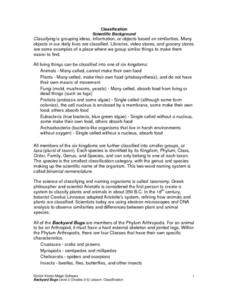Curated OER
Animal and Plant Habitats
Second graders write and illustrate a story. In this habitats lesson plan, 2nd graders learn about different types of plant and animal habitats. Students view video segments about habitats, answer comprehension questions, complete a...
Curated OER
Variation
Students recognize similarities and differences in plants. In this plants and animals lesson plan, students begin to classify living things by observable characteristics. Students watch clips from the Internet and play online games....
Curated OER
Backyard Bugs
Explore the concept of scientific classification and the similarities and differences between plant and animal species. Your class will participate in hands-on activities by investigating dichotomous keys and classifying their shoes. To...
Alabama Learning Exchange
It's a Small, Small World
Students compare and contrast the different characteristics of animal-like, plant-like, and fungus-like protists. They list examples and describe the characteristics shared by the three protist groups. They create a brochure or slideshow...
Curated OER
Living vs. Non-Living Things
Fourth graders describe the characteristics that determine if something is living, dead, or non-living. They determine the difference between living and non-living things. Students determine if an object is living or non-living and...
Cornell University
Insect Anatomy
Young entomologists discover insect anatomy in a very detailed unit plan. Offering background information for teachers about various insects, class members explore the differences between bugs and insects—and yes, there are many...
Curated OER
Linnaeus' Latin Lingo
Students use Latin and Greek words to figure out species names for whales.






